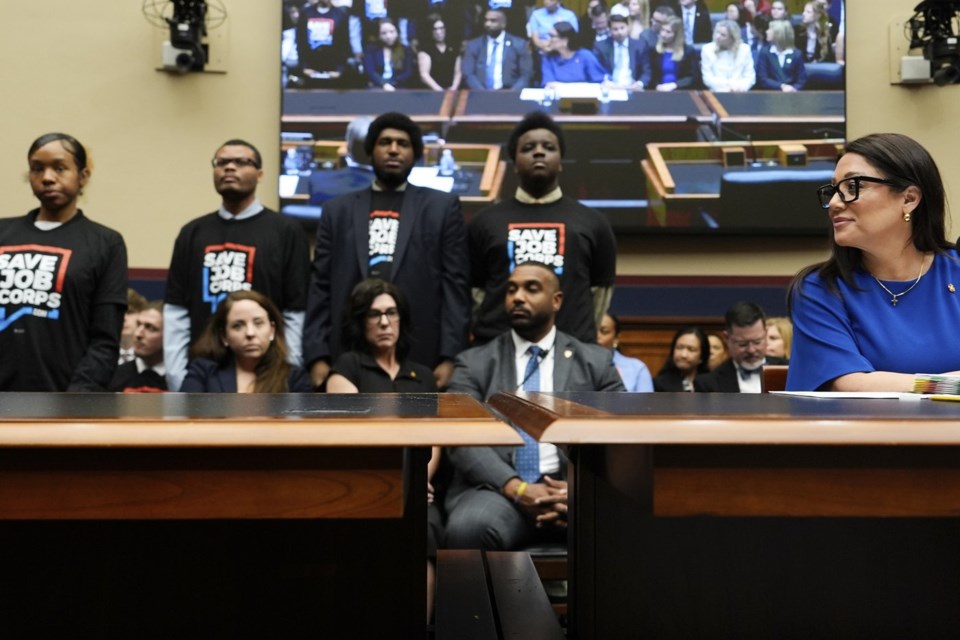NEW YORK (AP) — A federal judge on Wednesday granted a preliminary injunction to stop the U.S. Department of Labor from shutting down Job Corps, a residential program for low-income youth, until a lawsuit against the move is resolved.
The injunction bolsters a temporary restraining order U.S. District Judge Andrew Carter issued earlier this month, when he directed the Labor Department to cease removing Job Corps students from housing, terminating jobs or otherwise suspending the nationwide program without congressional approval.
Founded in 1964, Job Corps aims to help teenagers and young adults who struggled to finish traditional high school and find jobs. The program provides tuition-free housing at residential centers, training, meals and health care.
“Once Congress has passed legislation stating that a program like the Job Corps must exist, and set aside funding for that program, the DOL is not free to do as it pleases; it is required to enforce the law as intended by Congress,” Carter wrote in the ruling.
Department of Labor spokesperson Aaron Britt said said the department was working closely with the Department of Justice to evaluate the injunction.
“We remain confident that our actions are consistent with the law,” Britt wrote in an email to The Associated Press.
The Labor Department said in late May that it would pause operations at all contractor-operated Job Corps centers by the end of June. It said the publicly funded program yielded poor results for its participants at a high cost to taxpayers, citing low student graduation rates and growing budget deficits.
The judge rejected the department's claims that it did not need to follow a congressionally mandated protocol for closing down Job Corps centers because it wasn't closing the centers, only pausing their activities.
“The way that the DOL is shuttering operations and the context in which the shuttering is taking place make it clear that the DOL is actually attempting to close the centers,” Carter wrote.
The harm faced by some of the students served by the privately run Job Corps centers is compelling, the judge said. Carter noted that one of the students named as a plaintiff in the lawsuit lives at a center in New York, where he is based.
If the Job Corps program is eliminated, she would lose all the progress she’s made toward earning a culinary arts certificate and “will immediately be plunged into homelessness,” the judge wrote. That’s far from the “minor upheaval” described by government lawyers, he said.
As the centers prepared to close, many students were left floundering. Some moved out of the centers and into shelters that house homeless people.
“Many of these young people live in uncertainty, so it takes time to get housing and restore a lot of those supports you need when you’ve been away from your community for so long,” said Edward DeJesus, CEO of Social Capital Builders, a Maryland-based educational consultancy which provides training on relationship-building at several Job Corps sites. “So the abrupt closure of these sites is really harmful for the welfare of young adults who are trying to make a change in their lives.”
The National Job Corps Association, a nonprofit trade organization comprised of business, labor, volunteer and academic organizations, sued to block the suspension of services, alleging it would displace tens of thousands of vulnerable young people and force mass layoffs.
The attorneys general of 20 U.S. states filed an amicus brief supporting the group's motion for a preliminary injunction in the case.
Monet Campbell learned about the Job Corps’ center in New Haven, Connecticut, while living in a homeless shelter a year ago. The 21-year-old has since earned her certified nursing assistant license and phlebotomy and electrocardiogram certifications through Job Corps, and works at a local nursing home.
“I always got told all my life, ‘I can’t do this, I can’t do that.’ But Job Corps really opened my eyes to, ‘I can do this,’” said Campbell, who plans to start studying nursing at Central Connecticut State University in August.
The program has been life-changing in other ways, she said. Along with shelter and job training, Campbell received food, mental health counseling, medical treatment and clothing to wear to job interviews.
“I hadn’t been to the doctor’s in a while,” she said. “I was able to do that, going to checkups for my teeth, dental, all that. So they really just helped me with that.”
Campbell said she and other Job Corps participants in New Haven feel like they’re in limbo, given the program’s possible closure. They recently had to move out for a week when the federal cuts were initially imposed, and Campbell stayed with a friend.
There are 123 Jobs Corps centers in the U.S., the majority of them operated by private organizations under agreements with the Department of Labor. Those private jobs corps centers serve more than 20,000 students across the U.S., according to the lawsuit.
____
Susan Haigh in Hartford, Connecticut and Rebecca Boone in Boise, Idaho contributed to this report.
Cathy Bussewitz, The Associated Press




